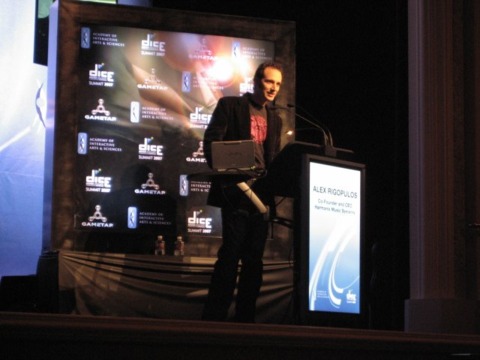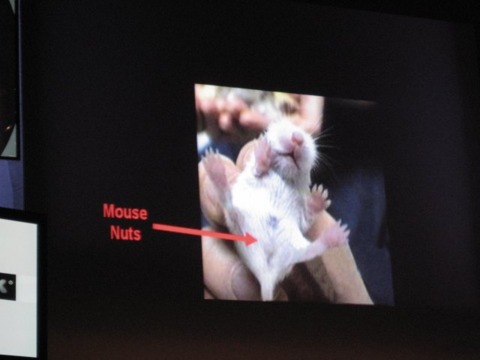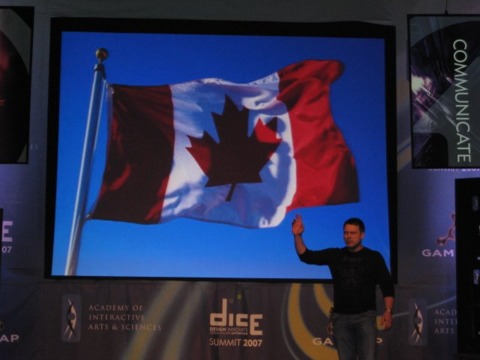D.I.C.E. 07: Alex Rigopulos, Chris Taylor open kimonos in Vegas
Two of the game industry's most admired discuss the meaning of success in this very material world.
The Confessions of Chris Taylor
LAS VEGAS--"I'm going to come out with some stuff."
That was uttered by one of the more interesting figures in the game industry--Gas Powered Games founder Chris Taylor. After successes with the Dungeon Siege franchise, GPG is going futuristic with the PC real-time strategy game Supreme Commander, the spiritual successor to Total Annihilation.
But Taylor wasn't here to talk about level design, strategic zoom, or anything else on the technical side. Taylor, through a speech that was part stand-up comedy routine and part Tony Robbins-style motivational speech, just wanted people to relax, and rethink and reassess what drives them to succeed, just as Taylor--attendees found out--had himself done.
His message throughout the hour-long talk was a call to the industry to drop the notion that game-development studios are akin to sweat shops. Long hours and overtime aren't new concepts to the industry, particularly when a holiday deadline is on the horizon.
Taylor believes he knows the secret to keeping a happy, productive workplace and wasn't afraid to share it with the room.
"Creative people don't stop creating when they leave the office," he said as he paced the stage. At GPG he instilled a policy of going to work, working the eight-hour day, then heading home to be with his family. "When I figured that out, our productivity went up."
He also pleaded with gamemakers to "Love the Art," which he visually represented with a drawing of his own (that seemed to belong posted on the family refrigerator). In his early days, he says he walked the edge, pushed the pedal to the metal, and confessed to maintaining inflated bravado, to the nines.
"I'm level f**ing 200 as far as I'm concerned," he said, channeling his former self.
But he's no longer a 20-, 25-, or 30-years-old making games for 20-year-olds anymore. He has a family, and in a moment of clarity, shifted his priorities. He believes that developers should put their health and family first and second, and the game can be a distant third and still be a success. --T.S.
Alex Rigopulos: Whose dream is it, anyway?

If there's one story the game industry can recite almost by heart, it's the 12-year rags-to-riches history of Guitar Hero developer Harmonix Music Systems. Led by cofounders Alex Rigopulos and Eran Egozy, Rigopulos in particular has outlined the dogged drive behind the studio's success in dozens and dozens of interviews. So it was with some curiosity (and maybe a small dose of skepticism) that D.I.C.E. attendees this morning took their seats for Rigopulos' presentation, titled "Living the Dream" (a title foisted upon him by the D.I.C.E. organizers, rather than one he picked).
What more could be unearthed about the company that struggled through a long run of critically acclaimed titles that sunk repeatedly when it came to sales--Frequency and its sequel, Amplitude, in particular?
Of course, the studio's recent history with Guitar Hero and Guitar Hero II, and the subsequent sale of the studio to Viacom, reversed the sting of the studio's long string of bad luck at the checkout counter and added a coda of depth and timeliness to the Harmonix story. But still, what didn't we know about Harmonix and its rise to fame to warrant the early call of 9 a.m. in Las Vegas?
Even with so much already known about the developer, hearing the ever humble Rigopolus himself tell it--with a slew of quirky and intentionally funny slides--injected new life into his and the studio's amazing time line.
Rigopulos recalled the studio's many attempts to bring the joy of creating music to the non and amateur musician as one "blinded by entrepreneurial enthusiasm," as well as being one that repeatedly threw Harmonix staffers into a "pit of despair" when yet another musically based game tanked at retail.

As Rigopulos admits, the studio spent its first five years creating improvisational musical experiences, all with very little success. It was a time filled with "plenty of false starts and misadventures," as he recalled.
"But then something happened," Rigopulos said. "The first musical games appeared in Japan." PaRappa the Rapper and Beatmania led the charge in 1997 and 1998. Rigopulos called those titles "simplistic," but they revealed "a hint of what musical games could be."
It was then that Harmonix started to delve deeper into the music genre. Sony greenlit Frequency, and later Amplitude (in spite of Frequency's poor sales).
Rigopulos recalled one failed pitch before Sony committed: When the Harmonix team hit the road to demo Frequency, the requirements of the demo were that they often needed the publisher to provide tech support at the pitch location. As they waited for tech support to help them at their pitch to Electronic Arts product development execs, a staffer entered the room and looked the developers over. Rigopolus recalls asking the staffer if he was tech support. It was EA exec Bing Gordon, and the demo only went downhill from there.
Then Konami courted the studio with Karaoke Revolution. And Sony returned with a pitch to the studio to create a title for the EyeToy--the result of the Sony effort was AntiGrav, an extreme-sports game that put the gamer's in-game character on a hovercraft.
"It was fun when it worked," said Rigopulos, but the game was unplayable in low-light situations, which caused havoc with the peripheral not being able to correctly pick up the moves of the player. And it took the team away from music, the area that was the singular fascination of Harmonix staffers--though the experience seemed to only harden the commitment of the team. "We had to remind ourselves to stay focused, making ourselves better, and doing it right, until we succeeded."
Of course, the tide turned dramatically when the game studio was approached by peripheral maker Red Octane, a company Rigopulos said "shared a view that the music category was poised to explode."
The Red Octane proposal was simple: "If we [Red Octane] build a guitar peripheral, will you build a game for it?" according to Rigopulos.
The game was to be built around a collection of rock classics.
Harmonix agreed, but internally, the Harmonix principals felt the game was "doomed for failure."
Why?
"The company was small, it had no track record, and we weren't sure rock was still culturally powerful," Rigopulos shared with the D.I.C.E. audience. He also considered the challenge of selling such a huge peripheral into the retail channel.
The entire model, the Harmonix staff determined, was enormously challenging, in spite of the company looking for a business model that would embrace a game title that had been circulating among staffers for months, Guitar Hero.
In the end, the studio's decision to work with Red Octane was the kind of balls-to-the-wall attitude that drove the Harmonix team's interest in music in the first place--the utter joy and bliss they experienced when making it.
"On the other side of the ledger," Rigopulos said rhetorically, as it might have been said four years ago as the Red Octane deal was being considered. "F*** yeah, we wanted to make Guitar Hero!!"
The rest is history, of course. Best Buy's initial order of Guitar Hero was tiny, but the mass-market retailer put the game on in-store kiosks, and units "blew out of the store in days," Rigopulos recounted. Then YouTube videos documenting the antics of Guitar Hero players began to surface and the buzz built," Rigopolus recalled. "Apparently, something was up."
"Apparently" ultimately led to the studio being acquired by Viacom's MTV brand.
So. Back to the title of the D.I.C.E. presentation: "Living the Dream."
"One thing [changed]. We no longer live in constant fear of instant death. Now, we can swing to the fences in ways we couldn't as a small, independent developer with limited resources," Rigopulos said.
But it was what didn't change that Rigopulos really threw his heart into explaining during the presentation.
"Lasting fulfillment doesn't come from one achievement. And the prevailing sentiments now are the same: self-doubt, stress, urgency, anxiousness...All the old fears and anxieties have been replaced with new ones," he said in a moment of obvious transparency. He referred to not wanting to disappoint MTV execs who "staked their careers and put their faith in us."
In conclusion (and it sounds worse than it likely is), Rigopolus said "the actual texture [now] of our inner lives is pretty much identical to the past 12 years."
And ultimately, Rigopulos said, the joke is on us, or more specifically, the designers in the audience.
"In our real lives, there's also always the next level we're chasing after...But really, there are few blessings in life that are quite so great as to be able to spend one's days laboring creatively in the service of something that one genuinely loves. This is really the dream all game creators are living with all the time."
So the session title was correct, after all. --C.F.
[For a different take on D.I.C.E. 2007, take a look at the GameSpot News Blog, containing interviews with Myst Online's Rand Miller and Lord British himself, NCsoft exec producer Richard Garriott.]
Got a news tip or want to contact us directly? Email news@gamespot.com

Join the conversation